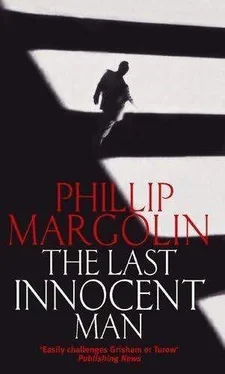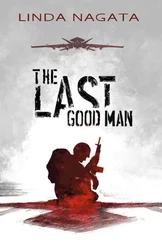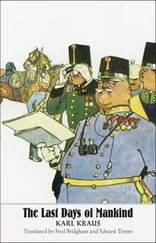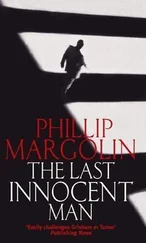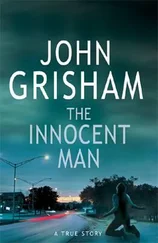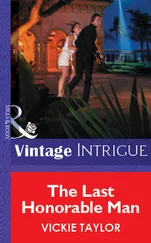- Margolin - The Last Innocent Man
Здесь есть возможность читать онлайн « - Margolin - The Last Innocent Man» весь текст электронной книги совершенно бесплатно (целиком полную версию без сокращений). В некоторых случаях можно слушать аудио, скачать через торрент в формате fb2 и присутствует краткое содержание. Жанр: Триллер, на английском языке. Описание произведения, (предисловие) а так же отзывы посетителей доступны на портале библиотеки ЛибКат.
- Название:The Last Innocent Man
- Автор:
- Жанр:
- Год:неизвестен
- ISBN:нет данных
- Рейтинг книги:4 / 5. Голосов: 1
-
Избранное:Добавить в избранное
- Отзывы:
-
Ваша оценка:
- 80
- 1
- 2
- 3
- 4
- 5
The Last Innocent Man: краткое содержание, описание и аннотация
Предлагаем к чтению аннотацию, описание, краткое содержание или предисловие (зависит от того, что написал сам автор книги «The Last Innocent Man»). Если вы не нашли необходимую информацию о книге — напишите в комментариях, мы постараемся отыскать её.
The Last Innocent Man — читать онлайн бесплатно полную книгу (весь текст) целиком
Ниже представлен текст книги, разбитый по страницам. Система сохранения места последней прочитанной страницы, позволяет с удобством читать онлайн бесплатно книгу «The Last Innocent Man», без необходимости каждый раз заново искать на чём Вы остановились. Поставьте закладку, и сможете в любой момент перейти на страницу, на которой закончили чтение.
Интервал:
Закладка:
: Phillip Margolin
The Last Innocent Man
1
David Nash could see the storm clouds closing in on Portland from his office on the thirty-second floor of the First National Bank Tower. The rain would be a welcome relief from the June heat. The first large drops started falling on the river. David watched for a while, then turned his back to the window. Across the room Thomas Gault shifted his position on the couch.
The newspapers called David “The Ice Man” because of his unruffled appearance in court, but Gault deserved the title. It was almost eight o’clock. The jury had been deliberating for two days. But Gault dozed, oblivious to the fact that twelve people were deciding whether he should be convicted of murder.
The telephone rang and startled David. Gault opened his eyes. The phone rang again and David answered it. His heart was beating rapidly as he raised the receiver. His hand felt sweaty against the plastic.
“Mr. Nash,” Judge McIntyre’s bailiff said, “we have a verdict.”
David took a breath to calm himself. His mouth was dry. It was always the same, no matter how many times he heard those words. They were so final, and despite his record of victories, they always left him with a feeling of despair.
“I’ll be right over,” David said, replacing the receiver. Gault was sitting up and stretching.
“Moment of truth, old buddy?” he asked as he yawned. He seemed to be experiencing none of the tension that David felt.
“Moment of truth,” David repeated.
“Let’s go get ’em, then. And don’t forget how you’re feeling. I want to interview you as soon as we hear the verdict. I talked to my editor this afternoon, and he’s hot to get the book into print as fast as he can. Capitalize on the publicity.”
David shook his head in amazement.
“How can you even think about that book now, Tom?”
Gault laughed.
“With what you’re charging me, I have to think about it. Besides, I want to make you famous.”
“Doesn’t anything ever get to you?” David asked.
Gault studied David for a second, his grin momentarily gone, his eyes cold.
“Not a thing, old buddy. Not a thing.
“Besides,” he said, the grin back in place, “I’ve been through a hell of a lot worse than this in Africa. Remember, those twelve peers of mine can’t kill me. Worse comes to worst, I get a few years off to write at state expense. And the worst ain’t gonna come, old buddy, because I have faith in you.”
Gault’s smile was infectious, and despite his misgivings, David found he was smiling.
“Okay, Tom, then let’s go get ’em.”
Outside, the rain and wind were twisting the large American flag that hung from the building across the street, winding it around itself and whipping it to and fro. One of America’s symbols taking a beating, David mused. If he was the lawyer everyone said he was, the blind woman with the scales would also go down for the count when they arrived at the courthouse.
IFDAVID HADnot been famous already, the Gault case would have made him so. Reporters from Paris and Moscow had flown into Portland to cover the trial of the handsome defendant who looked like a movie star and wrote like Joseph Conrad.
At nineteen, Gault, a member of a violent L.A. gang, had been given a choice between jail or the Army. Gault loved the military and was a natural for Special Forces training.
At twenty-six, Gault turned mercenary, putting his skills to work in East and West Africa.
All during his years abroad, Gault had been indulging another passion, writing. Plotted and fleshed out during his African sojourn, and completed during six months of furious activity in a cheap apartment in Manhattan, Plains of Anguish made Gault rich and established him as a writer of note. The novels that followed increased his literary reputation. But they were not the only reason Gault’s name was newsworthy.
Shortly after the movie version of his second novel was released, Gault married his leading lady. The gossip columns were suddenly full of stories about Gault’s latest affair or drunken brawl. When Gault drove his Rolls-Royce through the bedroom wall of his wife’s lover’s beach house, the missus called it quits. Gault, fed up with Hollywood, headed for the quiet of the Pacific Northwest.
A year later Gault emerged from seclusion, carrying the manuscript for ARansom for the Dying, which won the Pulitzer Prize. While working on the book, he had met Julie Webster, whom he was presently accused of beating to death.
Julie Webster Gault, the daughter of a former secretary of commerce, was beautiful, spoiled, and rich. To her parents’ horror, she married Thomas Gault after a brief courtship that consisted of several violent couplings in various odd places and positions. The marriage was doomed from the beginning.
Julie Webster was incapable of loving anyone but herself, and Thomas Gault was similarly afflicted. By the time the novelty of working their way through theKama Sutra wore off, the couple realized that they could not stand each other. Gault’s drinking, which was excessive in the best of times, got worse. Julie started wearing high-neck sweaters and sunglasses to cover her bruises. Then, one evening, someone beat Julie Gault to death in her bedroom on the second floor of their lakeside mansion.
The police arrested Gault. He swore that he was innocent. He told them he had been sleeping off a drunk when screams from his wife’s bedroom awakened him. He said he found Julie lying in a pool of blood and had knelt to take a pulse. A sudden movement behind him had made him turn, and he had seen an athletically built man of average height with curly blond hair standing above him. The intruder struck him on the head, Gault told the police, and he was unconscious for a few moments. When the police arrived, there was blood on Gault’s hands and bathrobe and a bruise on the left side of his face.
Whether Thomas Gault or a mysterious stranger had taken Julie Webster Gault’s life was the subject of a two-month trial. Famous writers and movie stars took the stand, either recounting the Gaults’ marital battles or coming to the writer’s defense. As the case neared its end, David was worried. Then Gault took the stand.
During the time that David represented him, Gault had not shown a single sign that his wife’s death disturbed him. To the contrary, he seemed happy to be rid of her. But Gault was a great actor, and his performance as a witness had been superb. He emerged from two days of direct and cross-examination as a sympathetic figure. He had even broken into tears once while testifying. The jury had been sent from the room and never saw how quickly Gault recovered his composure.
Gault was like that. He had an innate ability to tune in on, and manipulate, the feelings of other people. David found him a fascinating yet frightening man. An original in whom he sensed a quality of evil. Everything he knew about Gault made him believe that the writer’s detachment was genuine. Nothing appeared to touch him. Still, he wondered how Gault would react if the jury found him guilty.
FLASHBULBS EXPLODED, ANDa thin, attractive woman from NBC just missed David’s lower lip with a hand-held mike. David made a brief comment to the press as he elbowed his way through the crowd toward the courtroom. Gault followed, laughing and chatting with the reporters.
A local photographer asked Gault to pose for a picture, and Gault paused, sweeping his stylishly long brown hair backward to reveal his handsome profile. At a little under six feet, with a figure kept trim by constant exercise, Gault produced a good photograph.
Cameras clicked and the courtroom doors swept open. A stir of almost sexual excitement filled the courtroom when Gault entered. David watched the faces of the women. They wanted Gault. Wanted the thrill of lying next to him and wondering if his gift would be love or death.
Читать дальшеИнтервал:
Закладка:
Похожие книги на «The Last Innocent Man»
Представляем Вашему вниманию похожие книги на «The Last Innocent Man» списком для выбора. Мы отобрали схожую по названию и смыслу литературу в надежде предоставить читателям больше вариантов отыскать новые, интересные, ещё непрочитанные произведения.
Обсуждение, отзывы о книге «The Last Innocent Man» и просто собственные мнения читателей. Оставьте ваши комментарии, напишите, что Вы думаете о произведении, его смысле или главных героях. Укажите что конкретно понравилось, а что нет, и почему Вы так считаете.
